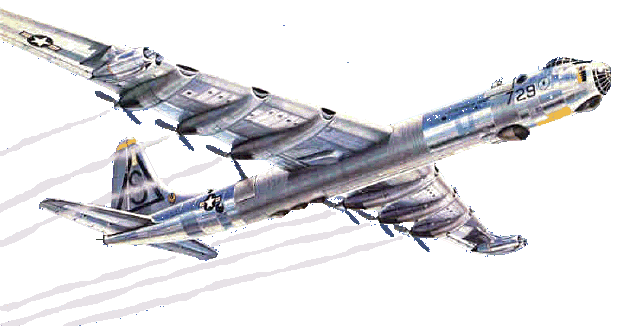|
|
| Convair B-36
Peacemaker |
 |
The B-36 was the largest American bomber every produced. Its 230
foot wingspan was almost fifty percent longer than that of the huge
B-52 that replaced it. During its eight years of service, it one of
one of America's major deterrents to aggression by a potential
enemy. It was "keeping the peace." Its is famous for "never
having fired a shot in anger."
Development of the huge plane began in 1941 when it appear that
Great Britain would soon fall to Nazi Germany. The Army Air Force
wanted a bomber that could fly from the United States to Europe,
drop bombs, then return (combat radius) The prototype first flew
on August 8, 1946. The first operational models were delivered to
the Strategic Air Command 1948. There were many problems with them
and the fleet was not fully operational until 1951.
The Peacemaker achieved its design objective. Its combat
radius with a 10,000-pound payload (one small nuclear bomb) was
3,740 nautical miles. With its maximum of bomb load of 86,000
pounds, (conventional bombs), its combat radius decreased to 1,757
nautical miles.
Each B-36 cost $3.6 million. A total of 388 aircraft were
produced. The last one was built in August of 1954. On 29 June
1955 the first B-52 was delivered to SAC. All of the B-36s were
delivered as or converted to "J" models, which had two jet engines
added to each wing. (This was essentially the inboard engine
nacelle from the B-47). The all-jet bomber soon took over the
Peacemaker's duties. The last B-36 was retired in 1959. |
|
